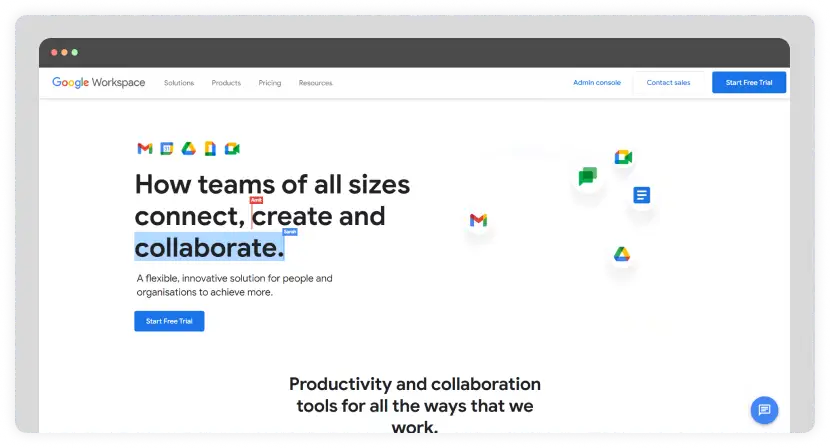
What is the difference between free and paid email hosting?
Paid email hosting offers you many features and advantages over free plans. Let’s understand both in detail:
Free email hosting
Free email hosting allows you to manage email accounts through webmail (POP) and email client (IMAP). Some free email hosting providers are Google’s Gmail, Yahoo, Microsoft’s Hotmail, etc.
Pros and Cons
✅ Have adequate file storage for small businesses and individuals.
✅ No need to commit or sign a contract.
❌ Weaker security measures.
❌ As an email address without a domain name doesn’t create professionalism, the recipient might doubt your identity or authenticity.
❌ Less cloud storage for big businesses.
❌ It might show you irritating banners or advertisements.
Having paid or professional email hosting can offer many benefits over free plans. Let’s discuss the features of paid email hosting services.
Paid email hosting
If your business has a huge audience size or storage requirements, it is recommended to go for a paid email hosting provider. Such a plan will fit the need of your growing business and offer you many advantages over free hosting:
✅ A personalized professional-looking domain name like [email protected]. Such email addresses help build brand identity, awareness and enhance your organization’s credibility among users.
✅ More storage space.
✅ Robust antivirus and spam filters.
✅ No advertisements.
✅ IMAP/POP3 protocols.
Different kinds of email hosting
When deciding about email hosting, the first thing to clarify is how you will host your emails. Here are three ways to do choose from:
1. IMAP email hosting
IMAP stands for Internet Message Access Protocol. IMAP email hosting transfers all the emails to your server, but it doesn’t get transferred to all the devices you have logged in to.
You can view, organize, and delete the emails stored on the server and decide which emails you want to transfer. That way, you can save storage across devices. Such email hosting is used by businesses.
2. POP3 email servers
It stands for Post Office Protocol 3 and is among the most common email hosting services. Internet services providers often give email accounts along with internet services.
With POP3 email hosting, all the incoming emails will get downloaded to your device. It allows you to access them even when you are offline.
The limitation of POP3 is that you can’t access the emails on multiple devices, such as if emails are downloaded on your laptop, you won’t be able to access them on your mobile phone.
3. Cloud email hosting
Cloud email hosting is affordable and best suited for small businesses or SMEs. Hosting emails on a cloud server offers many benefits like security, easy access to data, cheap upgrade, and no need to purchase hardware or software, reducing your cost.
Examples of cloud email hosting are G Suite by Gmail and Microsoft Exchange Emails by Microsoft.
What features should you look for in email hosting providers?
Here are some of the must-have features in an email hosting provider:
✅ Offers security
Your subscribers and clients have faith in your business and trust you with confidential information such as their details, financial information, etc. So, your hosting server must-have features like data security, anti-malware, anti-spam, and the likes.
✅ Flexibility and reliability
Email host providers must give you enough flexibility over your emails and associated files. Besides that, it should be reliable and must have a good reputation.
✅ Easy to access
You may access your email via different platforms that require different configurations. So, look for an email hosting provider that offers you access to webmail, IMAP, and POP.
-
Webmail – Webmail allows you to use a web-based email client, which is very convenient
-
IMAP – IMAP allows you to read your email from any device without downloading them.
-
POP – POP, on the other hand, requires that you download your emails before reading them.
✅ Not blacklisted
Having your IP address blacklisted can greatly impact your business activities, and it can take longer to get it non-blacklisted. For that reason, you should avoid email hosts with a reputation for getting domains on blacklists. Why? Because you may end up with a blacklisted recycled IP.
You can check an email host blacklist status on MxToolbox.
7 best email hosting providers to consider
Here is a list of 7 best email hosting providers that you can choose from:
1. Google Workspace
| Price | Attachment size limit | Storage |
|---|---|---|
| Depending on the package, $6 to $18 per user per month | 25 MB | 30 GB to 5 TB |
Pros and Cons
✅ Easy integrations with the other Google Workplace suite like Google Drive and Sheets.
✅ Smart reply and compose features help you write emails faster and with fewer errors.
✅ IT support is not required to backup files.
❌ Higher per-user license costs.
2. Dreamhost
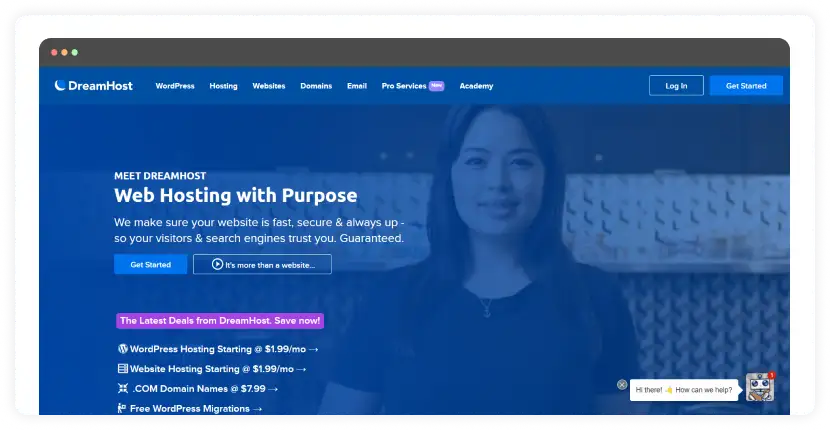
| Price | Attachment size limit | Storage |
|---|---|---|
| Starting at $1.67 per mailbox per month | Not applicable | 25 GB |
Pros and Cons
✅ Low cost most suitable for small businesses.
✅ Large inbox size.
✅ Offers free inbound spam filtering.
❌ The pricing structure of different plans can be unclear.
3. SiteGround
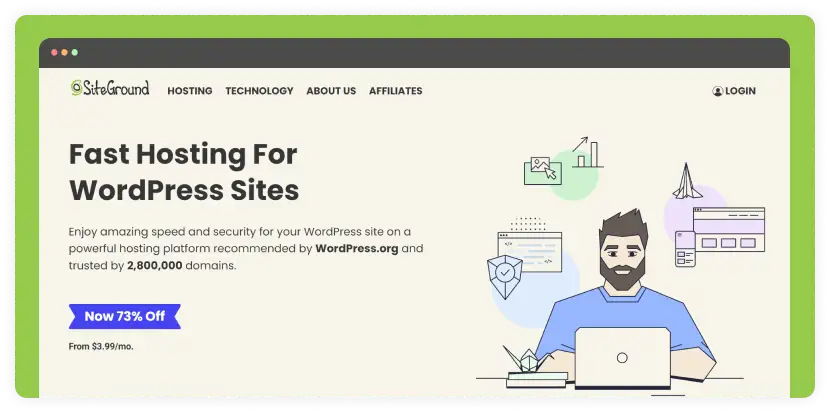
| Price | Attachment size limit | Storage |
|---|---|---|
| $4.99 to $14.99 per month | Not applicable | Unlimited |
Pros and Cons
✅ Unlimited inbox size.
✅ 24/7 customer support.
✅ Amazing customer reviews.
❌ Doesn’t provide email hosting exclusively.
4. A2 Hosting
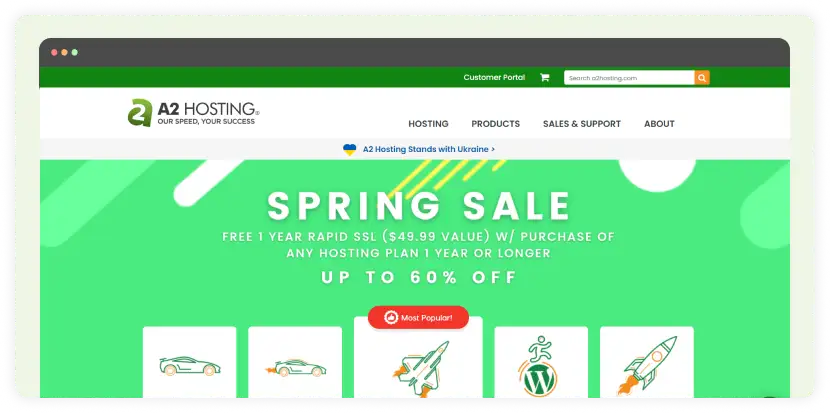
| Price | Attachment size limit | Storage |
|---|---|---|
| Shared hosting to Dedicated server – $2.99 to $129.99 if you opt for a 36-month plan | Not applicable | 100 GB to unlimited (depending on the package) |
Pros and Cons
✅ Unlimited inbox size.
✅ Complete protection against email spam.
✅ Offer a money-back policy.
❌ Email hosting is available only in combo with web hosting.
5. Zoho Mail
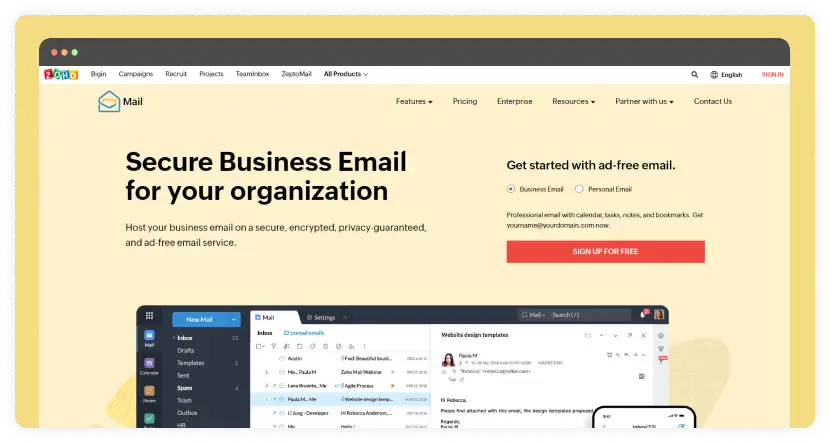
| Price | Attachment size limit | Storage |
|---|---|---|
| $1 to $4 per user per month | 250 MB to 1 GB | 5 GB to unlimited |
Pros and Cons
✅ Send attachments up to 1 GB in size.
✅ POP and IMAP access.
✅ Easy integration with Zoho’s optional business productivity apps.
❌ Spam filtering is limited.
6. Hostinger
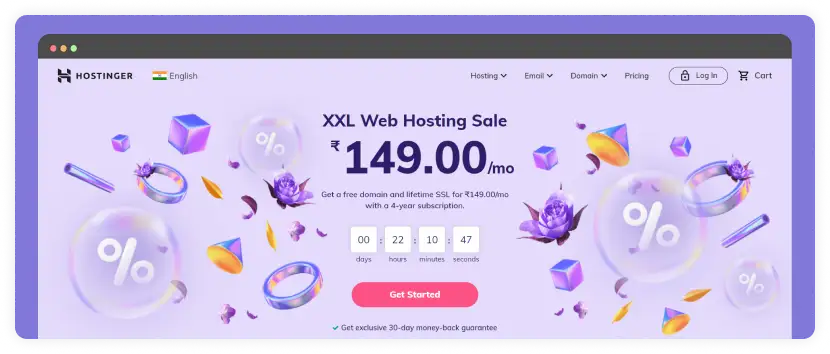
| Price | Attachment size limit | Storage |
|---|---|---|
| Business email – $0.99/month USD | Not applicable | 10 GB |
| Enterprise email – $2.49/month USD | Not applicable | 30GB |
Pros and Cons
✅ Inexpensive and best suited for small business email hosting.
✅ Unlimited email accounts & forwarders.
✅ 30-day money-back guarantee.
❌ No traditional cPanel.
7. Bluehost
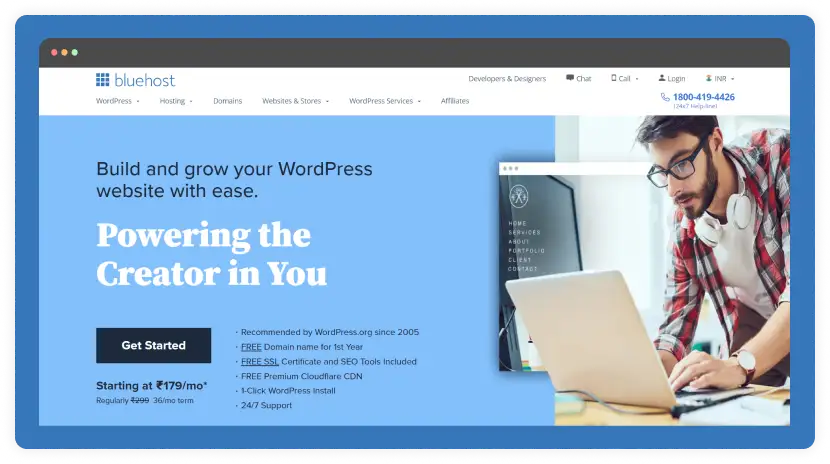
| Price | Attachment size limit | Storage |
|---|---|---|
| Basic – $4.95/month | Not applicable | 100 MB per account |
| Plus – $7.45/month | Not applicable | Unlimited |
| Choice plus – $7.45/month | Not applicable | Unlimited |
Pros and Cons
✅POP3 and IMAP4.
✅24/7 support.
❌ Poor backup options.
https://www.mailmodo.com/guides/email-hosting/






